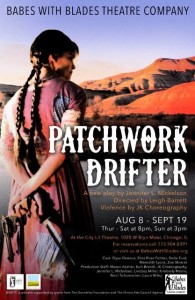
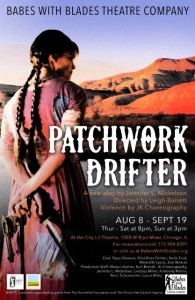 [rating=4]Note: this Review refers to a preview performance in which the director is still making changes in front of an audience in preparation for opening night.
[rating=4]Note: this Review refers to a preview performance in which the director is still making changes in front of an audience in preparation for opening night.
I arrived at City Lit Theatre, located on the second floor of a Presbyterian Church in Edgewater, early so I spent some time exploring. Programs for previous plays such as, “Bell of Amherst,” “The Tempest,” and “Wind in Willows” adorn the wall of this large building cramped full of quiet sanctuaries, small chapels, classrooms, and community resources. I have attended more unlikely productions here in the recent past such as “Bard Fiction” (a spoof on Quentin Tarintino’s bloodbath “Pulp Fiction”) and an all-female version of “Titus Andronicus.” The latter was produced by Blades with Blades and more than showcased their commitment to women engaged in stage and combat violence so I was fully prepared for something actioned-packed and bloody as I waited for a preview ensemble member Jenifer L. Mickelson’s new all-female-Western “Patchwork Drifter.”
What I found while watching was a fairly traditional America Family drama, centered on a woman and her two daughters, living on the 19thc Wyoming frontier. However, by calling it traditional, I in no way mean to belittle it. On the contrary, in style, plot, and substance, the play has an American-Canonical feel, and while Mickelson does struggle at times to create both theatrically engaging and historically convincing dialogue, in the important climatic scene, she more than delivers. There certainly was stage violence, but it only occurred when serving a narrative purpose, and I never got the sense that it was added for its own sake or done strictly for commercial reasons.
Harriet Cooper (Delia Ford) and her two daughters, Martha (Eliza Rose Fichter) and Abagail (Zoe Schiman) lives are upended when a stranger, Emmy (Meredith Rae Lyons), shows up, looking considerably worse for ware and is employed by Harriet as a seamstress and extra hand in the Cooper family general store. Eventually, a female bounty hunter, Hannah (Elyse Dawson), who is hot on Emmy’s trail, presses her way into the backroom where the bulk of the play’s action takes place, and is injured in a shoot-out (Violence Design: JK Choreography) with Emmy and the Cooper family. As they tie Hannah up and discover exactly who she is, all five women on stage are forced to confront and reveal secrets, which largely center on the role of the different men: good, bad, and in between, in their lives, and their own relationship to men or masculinity: fathers, brothers, husbands, and beaus are all discussed.
In her dialogue Mickelson is able to seamlessly weave nuanced, diverse, complex, sympathetic, and credible versions of male subjectivity into her script without ever having male characters appear on stage: a hurdle over which the most gifted playwrights, both male and female, have tripped. Simultaneously, director Leigh Barrett makes sure that our attention is fixed on the actresses and their character’s concerns as they reminisce, accuse, and cogitate. Consequently, the women remain front and center so that it is largely the memory of men from the past, with the exception Harriet’s eldest daughter Martha (who is courting a beau against her mother’s wishes), which force these character’s, Emmy and Harriet in particular, to reveal family secrets they have long kept secret from other character’s and evaluate the life that fate, men, and their own response and choices have carved out for them. Here, the tension, sense of loss, and tragedy that is evoked by mere dialogue is truly astounding.
Under Barret’s direction, the varied techniques of the actresses themselves also adds to the narrative and theatrical efficacy of Mickelson’s script. While Delia Ford’s decision to eschew any suggestion of Harriet’s buried past, focusing instead solely on her competence, is not an obvious choice and does make the play any less realistic than it otherwise would be (who could keep such secrets without wear), her technique does has have one undisputed advantage: what we discover about her is much more shocking than what we know from the beginning about Emmy from Meredith Rae Lyons quiet, introverted, and secretive performance (That of a highly damaged young women, probably on the run from something terrible). Elyse Dawson, and it is best not to know too know everything about her character before seeing the play, executes the role of Hannah as “straight shooter.” She is as exactly as she seems: a fierce individual, with no time for these women’s secrets, their feminine sphere, or tribulations all of which she sets about tearing to shreds immediately for reason’s related to her own past and relationship with men and masculinity.
While straddling the performances of her costars, Dawson’s Hannah will unite Emmy, with Harriet and the Cooper’s in their stories and secrets in ways which the audience could never imagine at the play’s outset. Eliza Rose Fichter and Zoe Shiman give more than apt supporting performances as Harriet’s daughters and are almost foils. Fitchter as Martha is the older, fiercely independent, intelligent, and determined sister. Shiman as Abigail is the dutiful daughter with an intense streak of both tenderness and naiveté about her.
The shoot-out, especially the injuries, where extremely convincing: I felt tense and scared, but I was amazed that more characters weren’t injured given the number of shots fired, the blocking, and the trajectory at which the bullets should have been flying. Somewhat intense, but historically expected, corporal punishment occurs in another, previous, scene, and it is both brutal and realistic while never being distasteful. Though violent, neither scene is gratuitous, and they both serve to wrench secrets from the play’s characters, driving the narrative forward (i.e. they are necessary to the plot). The scenic (Nicci Schumacher) and property design (Kurt Brandt) gave the good sense of the backroom of a general store, but the lighting design (Laura Wiley) could have more convincingly placed us in the West by creating a more arid or remote space, especially as this anything but your typical Western. Nonetheless, the Western genre is firmly maintained throughout the production and it remains one of the most finally crafted and skillfully produced all female plays I have seen to date.
“Patchwork Drifter” continues through September 19th, 2015. It is being produced by Babes with Blades Theatre Company at City Lit Theatre, located inside the Presbyterian Church at 1020 W. Bryn Mawr Avenue Chicago a couple blocks east of the Bryn Mawr Redline stop. Productions are Thursday’s through Saturday at 8:00 pm and Sunday’s at 3:00 pm with no performance Sunday, September 20th. Regular Tickets are $22. Student and Senior Tickets are $14 dollars. They can be purchased by calling the box office at 773-904-0391 or by visiting www.babeswithblades.com It runs approximately 83 minutes.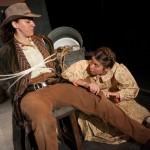
To see what others are saying, visit www.theatreinchicago.com, go to Review Round-up and click at “Patchwork Drifter”

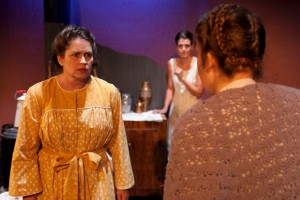

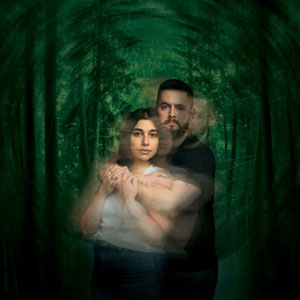



More Stories
” A Lie of The Mind”
“Titus Andronicus”
“Joseph and the Amazing Technicolor Dreamcoat”